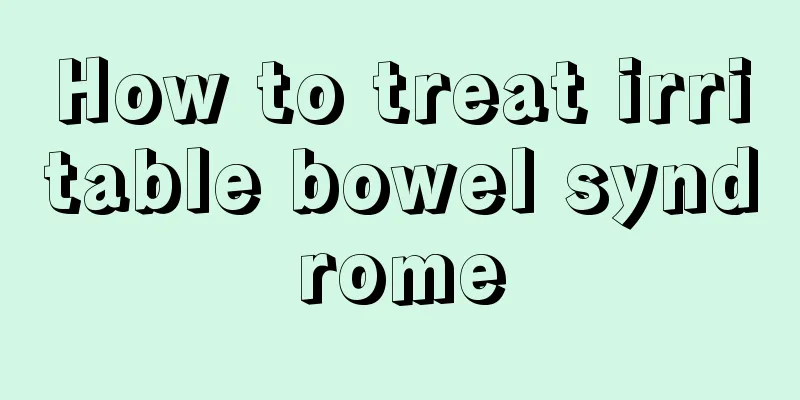How to treat irritable bowel syndrome

|
Nowadays, many young people suffer from irritable bowel syndrome. It is not a serious disease, but if it is not treated for a long time, it will lead to the collapse of body functions, so it is also worthy of attention. The reason why people nowadays suffer from irritable bowel syndrome is due to bad living habits, irregular eating and sleeping schedules. At first, they are just simple gastrointestinal problems such as constipation and diarrhea, but after accumulation, they can lead to serious problems. Here are some methods for treating irritable bowel syndrome. You can take a look and learn from it. Treatment should be individualized according to the patient's specific situation. The cause should be actively sought and eliminated, symptoms should be alleviated, and treatment should be limited to symptomatic treatment. 1. Adjust your diet Understand the patient's eating habits and their relationship with symptoms in detail, avoid sensitive foods, reduce gas-producing foods (dairy products, soybeans, lentils, etc.), high-fat foods inhibit gastric emptying, increase gastroesophageal reflux, and enhance postprandial colon motility. High-fiber foods (such as bran) can stimulate colon movement and have a significant effect on improving constipation. 2. Psychological and behavioral therapy Patiently explain the work to the patients, including psychotherapy, biofeedback therapy, etc. For those with symptoms such as insomnia and anxiety, sedatives can be given appropriately. 3. Medication (1) Gastrointestinal antispasmodics Anticholesterol drugs are the most commonly used. They can also partially antagonize the gastrocolic reflex and reduce intestinal gas production, thereby alleviating postprandial abdominal pain. Calcium channel blockers include nifedipine (nifedipine) and pinaverium bromide. (2) Gastrointestinal motility-related drugs: loperamide, domperidone (Metoclopramide), cisapride, etc. (3) Laxatives are usually avoided, but they can be used for a short period of time for those with severe constipation. Hemicellulose or osmotic laxatives are preferred. Taking 15 to 30 ml of lactulose before bedtime is also effective, especially for the elderly. (4) Psychotropic drugs: For patients with obvious psychiatric symptoms, appropriate administration of sedatives, antidepressants, and antianxiety drugs can be helpful. (5) To eliminate gastrointestinal bloating, dimethicone and medicinal charcoal (activated carbon) have the effect of removing gas and foaming, and are commonly used in clinical practice. (6) Intestinal probiotics Some patients with diarrhea may have intestinal flora disorders, and the use of intestinal probiotic preparations can be helpful. (7) Other 5-HT4 receptor partial agonists such as tegaserod are effective for constipation-type IBS and can significantly improve patients' abdominal pain symptoms. The 5-HT3 receptor antagonist alosetron is effective for diarrhea-predominant IBS. I hope the above treatment options for irritable bowel syndrome can help you. What I suggest to everyone is to exercise more, so that diseases will stay away from you. |
<<: Benefits of lemongrass essential oil
>>: How to treat pathological floaters
Recommend
Is premature graying of hair hereditary?
We must have often seen the disease of premature ...
Why does my mind feel foggy and unclear every day?
Our current pace of life is very fast. In a fast-...
What are the symptoms of advanced rectal cancer? You should know about them
When rectal cancer reaches the late stage, its sy...
Effects of Borneol Alcohol Mix
Borneol is a medicinal ingredient that is often s...
How do women wear invisible underwear
There are many styles of underwear. The most comm...
What are the obvious symptoms of pneumoconiosis
Pneumoconiosis is caused by occupational reasons,...
How to keep your private parts from getting dark?
Women nowadays are more concerned about beauty, e...
Acupuncture points for cold and flu
The symptom of wind-cold cold is relatively commo...
Which hospital is good for hamartoma
Which hospital is good for hamartoma? We all know...
How can I sober up?
When old friends get together, they inevitably dr...
What to do if a cow has a fever of 40 degrees
We humans often catch colds and have fevers. In f...
Difference between skin cancer and acne
Everyone knows that skin diseases are serious. Th...
What medicine should I take for a cold caused by wind and cold
In our daily life, especially in winter and sprin...
Why does my face turn red after running?
Everyone should be very familiar with the reactio...
What are the hazards of natural gas to the human body?
With the continuous advancement of technology in ...









